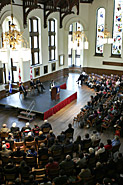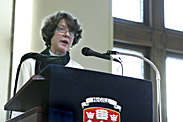Tsunami felt at McGill
"I'm tired and I'm crying." These words came from across the sea, from a McGill alumnus assisting in relief efforts in Sri Lanka. They are as appropriate as any to sum up the sense of sorrow and disbelief felt across the world as people struggle to come to terms with the tsunami disaster, one of the most devastating in history.

January 5 memorial service held in Redpath Hall for the tsunami victims and their families
Owen Egan
Here at McGill, Asia's tragedy was marked January 5 in Redpath Hall where Reverend Gwenda Wells of the Chaplaincy Service led a sombre, non-denominational service in an effort to help people come to grip with the unthinkable. The tragic consequences of the tsunami reached our own campus, its devastation directly affecting students, staff and alumni.
Among those killed was Nazly Hanum Lubis, a 1996 graduate of the Institute of Islamic Studies. Her husband, Amirul Hadi, who received a PhD from the Institute in 1996, survived but must further contend with the loss of their two children. The couple were among many to have studied here as part of the Indonesia Social Equity Project, a joint effort of McGill and Canadian International Development Agency that has awarded over 100 master's and PhD degrees to participating students. Project Director Wendy Allen lamented, "The real consequence is that the people affected are among the best and brightest. And we imagine that the building in Aceh in which they worked has been destroyed."
For some, thoughts of a regular semester are out of the question. Hari Suthan, a second-year law student from Sri Lanka, intends to return home to help his mother and sister cope with rebuilding their house and grieving for the loss of other family members.
"I can't concentrate on school right now," said Suthan; "I've got to get home and offer an expression of support. The community in Toronto is starting to come together with vigils and fundraisers but it's still very hard for people with family in the north [of Sri Lanka] because there's been a lot of press coverage, but still no phone lines."

Reverend Gwenda Wells, director of McGill's Chaplaincy Service, speaks at the memorial
Owen Egan
Presently, the McGill community is mobilized in identifying and supporting others affected by the disaster. With numerous students from Indonesia, Sri Lanka, India and other countries hit by the tsunami, the university is relying on International Student Services (ISS) and student groups to contact those who may have been affected.
"We're here to help people from any country," said ISS manager Pauline L'Ecuyer. Her office has been working tirelessly to make sure that students from the regions touched by the disaster are contacted personally by telephone.
Specific relief initiatives are beginning to take shape on campus, many of them led by student groups who have been working since December to develop appropriate responses to the catastrophe. At the Redpath ceremony, the Indonesian Students Association gave out mourning flowers that were hand-stitched with black and white fabric.
"People who can't express their feelings at this time can wear it," said Maila Rahiem of the association. "The black represents darkness and the white expresses hope." Rahiem and others have been working since December 27, offering condolences and helping to coordinate student-based relief efforts at McGill and Concordia. Such efforts have been bolstered by those of other groups such as the Muslim Students' Association and the McGill International Student Network.
At the ceremony, Andrew Bryan of the Student Society of McGill University reminded the gathering that "the McGill community is an international community," and affirmed that the organization was devoting its full administrative resources to help students respond to the disaster. His counterpart, Noah Billick, announced that the Post-Graduate Students' Society would be directing its budgetary surplus to the relief efforts.
From the administration, Dean of Students Bruce Shore and Principal Heather Munroe-Blum have published personal messages of condolence. In addition, Munroe-Blum delivered a short address at the ceremony, remarking sadly that "we must recognize that, in this tragedy, life has suffered an immense, unfathomable injury. And we must remember that all life is connected."
As the McGill community tries to comprehend and come to terms with the tsunami disaster, the university will continue to expand its efforts, both in identifying those affected and in finding a means of formally commemorating a tragedy of this scale. In the meantime, all we can do is grieve for those around us who have suffered direct and personal loss.
Further casualties from the McGill community include alumnus Mathieu Lafond, BComm'98, who died in Phuket while vacationing, and June Caroline Kander, a lecturer for Continuing Education from 1971–1981, who died while vacationing in Sri Lanka.
